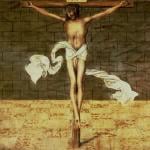It’s common sense that origin determines destiny. That which is born of flesh is flesh, and remains so; that which is born of earth returns to the earth. This is the common sense that the gospel subverts. Men originated from earth are remade after the image of the heavenly man; flesh dies and rises as Spirit. Or, what is equally astonishing: We are given a second origin, a new birth from God. Which means: The gospel subverts any social order... Read more
















